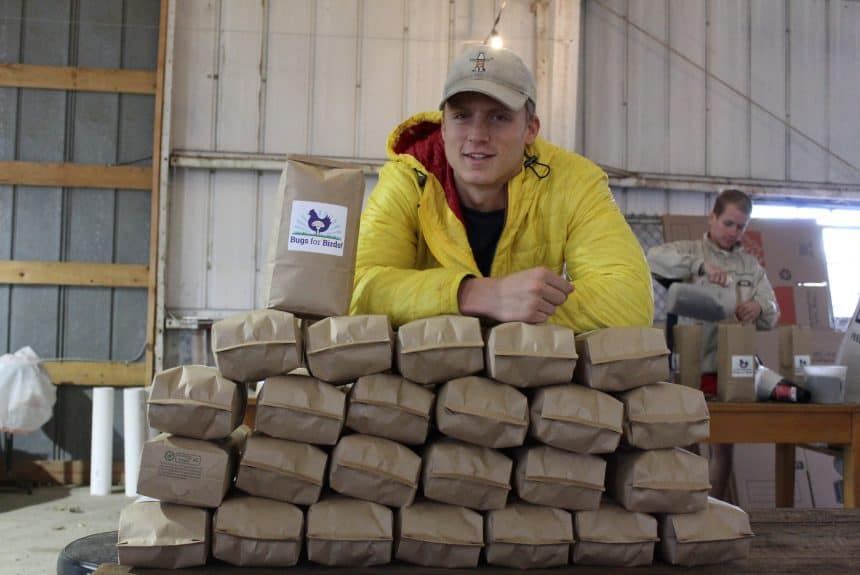By Jock Gilchrist, Research Fellow
Growing food is an essential human endeavor. But the practices that deliver food to its final point – in the grocery store, market, or restaurant – can be startlingly inefficient and damaging.
A third of all food grown in the world is wasted or lost – a value of almost $3 trillion dollars. Americans throw away almost half of all their produce. Globally, we use so much land to grow crops to feed livestock that we could feed an extra 3.5 billion people if those crops fed people instead.

A Boulder-based agricultural startup aims to change all of that. Bugs for Birds! was founded by Pierre Romain and dreamed up by Phil Taylor, the Executive Director of Mad Agriculture. It uses an innovative business model to efficiently feed livestock. Its supply chain reduces food waste, sequesters carbon in soil, and lessens dependence on harmful agrochemicals.
How does it work? Bugs for Birds! partners with a Canadian company that diverts fruit, vegetable, and grain waste from landfills. They use the organic waste as a substrate on which black soldier fly (BSF) larvae grow. The larvae are a great source of protein and essential nutrients for livestock like poultry and farmed fish.
A square meter of BSF larvae produces as much protein as an acre of soy, making it highly land efficient. It also fights climate change. By using food waste that would otherwise decompose in a landfill, it prevents the release of climate-warming methane.

Romain has two larvae-based products. The first is a “treat” – he adds nutritional supplements to the grubs and packages the mixture in compostable bags. They’re sold as chicken and wild bird treats on bugsforbirds.com, on Amazon, and by local suppliers in Idaho Springs, Hygiene, and soon, Boulder.
But Romain’s real innovation is his groundbreaking “complete feed.” Its focus on a regenerative supply chain leaves the earth a better place – and still generates a profit. He calls it a “climate-beneficial feed.”
The feed is no-soy and no-fishmeal, instead using grubs as the main protein source. Soymeal and fishmeal – the most prevalent sources of protein in livestock feed – lead to the destruction of virgin forests for soy mono-culture productions, and to the depletion of over-exploited wild fisheries to make fishmeal.
The rest of the feed’s ingredients grow on a farm in Nebraska, run by Steve Tucker, a pioneer of regenerative agricultural practices like no-till and cover cropping. This sequesters carbon, improves soil health, reduces erosion, and lessens the need for chemical inputs. Romain is confident that ingredients grown on live soil, without agrochemicals and synthetic fertilizers, yield more nutritionally dense products.
All told, these traits make BSF larvae an ideal food for chickens, especially since insects are part of their natural diet. The larvae improve feather production. Feedback on his chicken treat product reports stronger shells, deeper egg yolk colors and in one case a doubling of egg production.
People often wonder what they can do about the complicated problems facing our world, like food shortages, climate change, and inequality. One answer is to support businesses that offer real solutions to those problems. Using Bugs for Birds! feed is a way for consumers to directly sequester carbon, improve soil health, and support regenerative agriculture.
Bugs for Birds! also represents a new model for doing business. By using waste from other industries and producing no waste of its own, it is beneficial to the planet, society, and the economy. It provides a working example of how every company, and the entire economy, could operate.
To learn more about Bugs for Birds! please contact Pierre Romain at pierre@madagriculture.org or visit bugsforbirds.com.


Leave a Reply